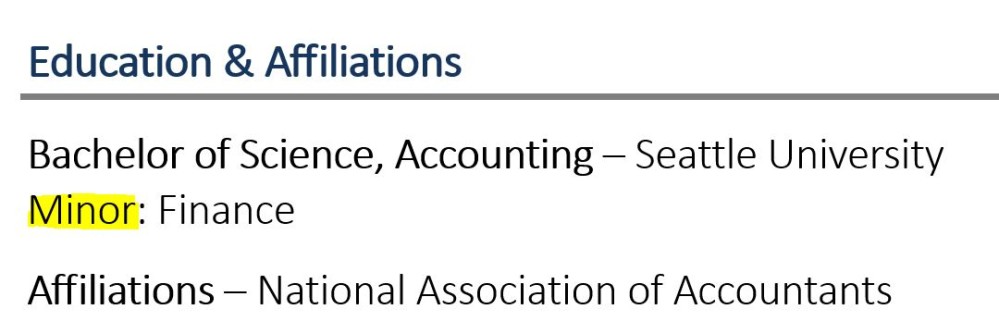How to List a Minor on a Resume (&Examples)

The education section of your resume can be of great importance if you're a new graduate or if you don't have much work experience. You can use relevant coursework and your fields of study as keywords. That's why many want to know how to add a minor on a resume.
Should you even be adding a minor to your resume? Here are a few general tips that cover when and how to include a minor on a resume.
Should you include your minor on a resume?
You should add your minor only if it's relevant to the position you're applying for.
Remember that your resume needs to contain relevant information to the position. Information that's irrelevant will do more harm than good--it's confusing and distracting for hiring managers.
If your minor is relevant to your career target, then you can include it. Here are some good examples:
Marketing minor for a business major graduate applying for business marketing jobs
Journalism minor for a communication major applying for writing positions
Math minor for any major applying for jobs involving statistics, data analysis, or finances
On the other hand, an unrelated minor would not strengthen your resume for any job target. If it's something you're passionate about, you can bring it up in your interview with a clear tie in to the job.
Expert Tip
still wondering if your experience is relevant? Consult our guide: What Does Relevant Experience on a Resume Mean?
How to list a minor on your resume.
You should list your minor underneath your degree, school name, and location. You should always label it as a "minor" to differentiate it from your primary major. If it's not obvious what your college major was, you can also include "major" before you list your degree.
Let's take a look at two examples:
Example 1: Finance minor on a resume

Example 2: Journalism minor on a resume

Emphasize the minor if it's relevant
You want to ensure that the hiring manager takes notice of your minor if it's relevant to the position you're applying for.
For example, if your major was accounting and your minor was finance, it would be really beneficial if you're applying for an accounting position at a big financial company.
So how should you emphasize it?
You can mention it in your resume summary, which is designed to be a brief overview of your qualifications. If your exposure to finance is from your minor (as opposed to work experience), you can include this detail right at the top of your resume.
You could also mention your minor in your cover letter. For example:
"I feel I would be a great match for this position as I not only have a degree in accounting but also a minor in finance..."
Summary
Adding your minor to your resume--if it's relevant--can give you a leg up on the other qualified candidates. Remember that your resume should contain information that's relevant to the position.
When a hiring manager looks at your resume they're basically asking: "Why are you a good fit for THIS position?" If your minor is how you would answer that question, it belongs on your resume!
Good luck with your job search!
Related posts:

